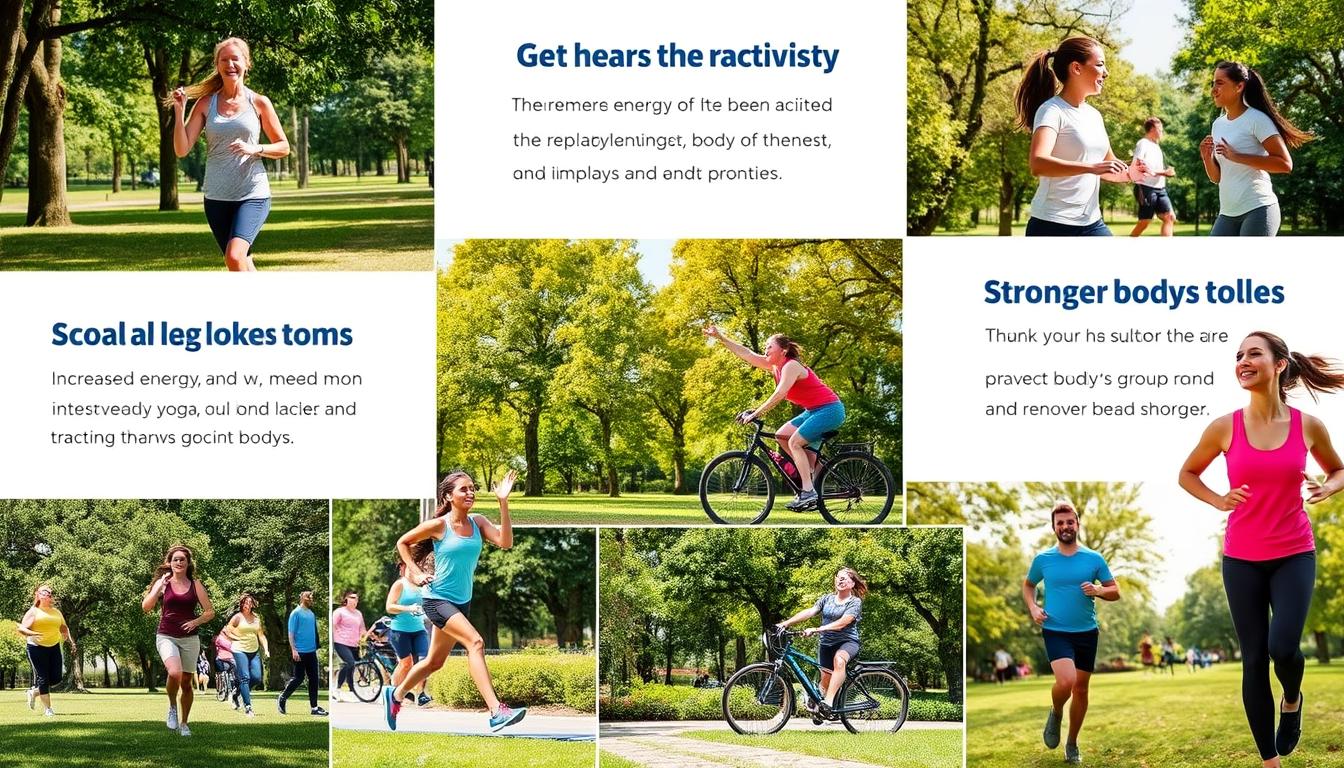Did you know that only 18% of Canadians meet the guidelines for regular physical activity? This startling statistic underscores the importance of exercise in our daily lives. Engaging in regular physical activity transcends mere vanity; it offers profound health benefits of staying active that can significantly enhance your overall well-being. From boosting mental health to reducing the risk of chronic diseases, understanding the numerous advantages of daily physical activity can motivate you to prioritize exercise in your routine.
As we delve deeper into the benefits of regular physical activity, you’ll discover how making time for exercise can significantly improve your life. Whether you’re a seasoned athlete or just starting out, the advantages of daily physical activity are accessible to everyone, highlighting the need for a consistent and active lifestyle. By exploring these benefits, you can find inspiration to take that essential first step toward a healthier, more fulfilling life. If you have any questions about starting your fitness journey, feel free to contact us for guidance.
Key Takeaways
- Only 18% of Canadians achieve recommended levels of exercise.
- Regular physical activity significantly enhances mental health.
- Engaging in exercise reduces the risk of chronic diseases.
- Physical activity helps maintain a healthy weight.
- Daily exercise can improve emotional resilience.
- Staying active promotes social interactions through community sports.
Enhanced Physical Health
Regular physical activity offers a plethora of benefits for physical health. A consistent exercise routine significantly enhances cardiovascular fitness, increases muscle strength, and improves bone density. These advantages extend beyond immediate effects, promoting a long-term healthier life.
Improved Cardiovascular Fitness
Aerobic exercises like running, swimming, and cycling are pivotal in boosting cardiovascular fitness. Such training enhances the heart’s efficiency in pumping blood, contributing to better overall health. This improvement in heart function reduces the risk of heart disease, enabling individuals to engage in physical activities with greater endurance.
Strengthened Muscles and Bones
Weight-bearing activities are crucial for strengthening muscles and bones. These exercises enhance muscle strength and increase bone density, crucial as age progresses. A robust muscular and skeletal system ensures individuals can perform daily activities without discomfort, reducing injury likelihood.
Boosted Mental Wellbeing
Engaging in regular physical activity offers substantial mental health advantages, notably in managing exercise and anxiety and enhancing emotional well-being. Studies reveal that those who engage in regular physical activity experience a notable decrease in anxiety and depression levels.
Reduced Anxiety and Depression
Physical activity acts as a natural remedy for anxiety and depression symptoms. Exercise triggers the release of endorphins, which boost happiness. Research indicates that moderate exercise can be as effective as medication for mild to moderate depression. Achieving depression reduction through exercise not only alleviates negative moods but also fosters a more positive outlook on life.
Enhanced Mood and Emotional Resilience
Incorporating consistent exercise into daily routines enhances emotional resilience. Individuals who regularly exercise learn to manage stress more effectively, adapting to challenges with greater ease. This improvement in mood is due to increased neurotransmitter levels that contribute to a sense of well-being. With an effective routine, achieving improved mental health is tangible. For detailed insights, visit the mental health benefits of exercise.
Weight Management
Attaining a healthy body weight is within reach through consistent physical activity. Exercise is pivotal in managing weight, reducing excess fat, and enhancing overall wellness. Engaging in regular exercise not only aids in calorie burn but also supports long-term health objectives.
Effective Calorie Burn
Exercise’s primary advantage lies in its ability to facilitate effective calorie burn. Various activities, such as running, cycling, or swimming, contribute significantly to calorie deficits essential for weight loss. This deficit enables individuals to enjoy a diverse range of foods while still achieving their fitness objectives.
Increased Metabolism
Regular physical activity boosts metabolic rate enhancement. This refers to the body’s caloric expenditure at rest. A heightened metabolic rate ensures the body continues to burn calories even during periods of inactivity. Incorporating exercises that build muscle can further amplify this effect, facilitating effective body weight management.
Increased Energy Levels
Integrating regular physical activity into your daily routine significantly boosts your energy levels. Engaging in physical workouts enhances sleep quality, a critical factor for overall wellness. An active lifestyle results in more restful nights, facilitating quicker sleep onset and deeper sleep cycles.
Improved Sleep Quality
The sleep benefits of activity transcend mere fatigue. A consistent exercise regimen aligns your body’s natural circadian rhythms, thereby improving sleep quality. This leads to enhanced body recovery, ensuring you wake up feeling refreshed and energized.
Enhanced Daily Productivity
Improved rest from increased energy levels significantly boosts daily productivity. Well-rested individuals exhibit better focus, clearer thinking, and effective time management. This creates a positive cycle, where enhanced productivity fuels the desire for an active lifestyle.
Better Immune Function
Engaging in regular physical activity is crucial for enhancing your immune system. Through consistent exercise, the body’s circulation is improved, facilitating the movement of immune cells and antibodies. This efficiency in immune response significantly reduces the risk of common illnesses.
Strengthened Immune Response
Exercise triggers the production of protective antibodies and boosts the effectiveness of white blood cells. These enhancements contribute to a more robust immune response. Consequently, active individuals often experience improved overall health, feeling more energized and less susceptible to illness.
Faster Recovery from Illness
Active individuals generally recover from illness more swiftly than those who are less active. This quicker recovery is due to enhanced circulation and a more potent immune response. Research indicates that regular physical activity not only prevents illness but also accelerates recovery, making it a vital aspect of maintaining long-term health. For further information, visit this resource.
Social Connections

Engaging in physical activities offers a unique platform for developing meaningful social connections. Many individuals find fulfilment in participating in exercise classes, sports teams, or local recreational activities. These settings create opportunities for community building through exercise, allowing people to form friendships centred around shared interests.
Building Community Through Exercise
Community building through exercise is an essential element of the social benefits of activity. When people come together to pursue fitness goals, they create a supportive environment that encourages consistency. This shared journey fosters bonding, leading to a strong sense of belonging and camaraderie among participants.
Engaging in Group Activities
Engaging in diverse group activities provides numerous group fitness benefits. Participants can enjoy various options, such as yoga classes, running clubs, or team sports. These group settings not only enhance physical health but also promote a sense of fun and motivation. Individuals often feel more inclined to maintain their fitness endeavours when surrounded by like-minded peers.
Enhanced Cognitive Function
Regular physical activity significantly enhances cognitive function benefits. This improvement is not a mere byproduct of fitness; it is a fundamental aspect of mental enhancement. It significantly boosts mental faculties such as memory, concentration, and creativity.
Improved Memory and Concentration
Engaging in activities that elevate heart rates increases blood flow to the brain. This can lead to enhanced exercise and memory. Studies reveal that active individuals often exhibit sharper focus and better retention of information. Consequently, they find it easier to learn new skills, making exercise indispensable for effective learning.
Greater Creativity and Problem-Solving Skills
Physical fitness is associated with increased innovative thinking, showcasing the creativity enhancement through fitness. Regular workouts lead to clearer thought processes, thereby improving problem-solving abilities. This mental enhancement can permeate various aspects of life, including professional and personal challenges. Research supports this correlation, highlighting how physical activity fosters a more effective cognitive approach. For further insights, refer to this resource.
Lower Risk of Chronic Diseases
Maintaining an active lifestyle is crucial for preventing chronic diseases through exercise. Regular physical activity significantly reduces the risk of serious health conditions. This underscores the importance of exercise in disease prevention.
Prevention of Heart Disease
Regular exercise is vital for heart disease risk reduction, promoting good cardiovascular health. It helps lower blood pressure and cholesterol levels, key factors in preventing heart ailments. Activities like walking, cycling, or swimming bolster heart health, reducing heart disease risks.
Reduced Risk of Type 2 Diabetes
Exercise also plays a significant role in preventing type 2 diabetes. It enhances insulin sensitivity, lowering diabetes risk. The benefits of regular exercise include improved blood sugar regulation and maintaining a healthy weight. Thus, prioritizing physical activity is essential for balanced blood glucose levels.
Enhanced Longevity

Regular physical activity brings about remarkable benefits, profoundly impacting longevity. A clear correlation exists between an active lifestyle and a notable increase in life expectancy. This underscores the critical role of consistent exercise in enhancing health outcomes and vitality.
Longer Life Expectancy
Research consistently affirms that exercise’s longevity benefits contribute to a longer lifespan. Active individuals experience a multitude of physiological improvements that counteract age-related decline. These include increased cardiovascular fitness, enhanced muscular strength, and better metabolic health. Such improvements are pivotal in fostering a life characterized by resilience and vitality.
Improved Quality of Life
Maintaining a fitness routine significantly enhances quality of life through fitness. Physical activity’s impact extends beyond longevity, positively influencing mental well-being and social connections. Engaging in exercise fosters an affirmative self-image, emotional resilience, and contributes positively to community through shared activities.
Better Stress Management
Regular physical activity emerges as a pivotal strategy for stress management. It offers a conduit for individuals to discharge accumulated tension and frustration. Engaging in activities like running, cycling, or weightlifting can significantly boost mood and induce a state of tranquility. This makes them particularly beneficial for those grappling with stress.
Physical Activity as a Stress Reliever
Exercise stimulates the release of endorphins, the body’s inherent mood enhancers. These chemicals facilitate relaxation and diminish anxiety. Even a brief walk can profoundly impact stress levels. Engaging in physical activity redirects focus, enabling individuals to temporarily escape from stressors and concentrate on fitness objectives.
Promotion of Mindfulness and Relaxation
Certain physical activities, such as yoga and Pilates, emphasize mindfulness. They foster an awareness of one’s body and breath. These practices not only fortify the body but also promote mental clarity and relaxation. They encourage individuals to remain present, effectively mitigating stress and enhancing overall well-being.
Accessible Fitness Options
The modern fitness landscape is replete with options that enhance accessibility. Individuals now benefit from home workouts and online classes, tailored to various fitness levels and preferences. These alternatives enable everyone to participate in physical activity from their homes, maximizing the benefits of home workouts.
Home Workouts and Online Classes
The rise of digital platforms has made home workouts increasingly popular. Individuals can access structured programs, including yoga, HIIT, or dance classes, with ease. These online resources cater to diverse lifestyles, ensuring fitness remains accessible for all, regardless of time or location. The flexibility of these options fosters a consistent exercise routine, encouraging newcomers to start their fitness journeys.
Community Programs and Resources
Community fitness programs further enhance accessibility by offering affordable or even free opportunities for physical activity. Local parks and recreation centres often provide classes or workout sessions, creating a space for individuals to connect while improving their health. Engaging in these programs promotes social interaction and encourages a collective effort towards better health and wellbeing. Finding such programs is as simple as visiting local community centres or checking for updates online. Individuals can also learn more about local opportunities at community resources to explore various options that match their interests.
Tailored Physical Activity Plans
Creating effective tailored fitness plans is crucial for achieving personal fitness goals. Understanding one’s objectives is the cornerstone of a well-structured exercise routine. Whether the aim is weight loss, muscle toning, or enhancing endurance, defining these goals enables meaningful adjustments in workout schedules and activities.
Understanding Personal Fitness Goals
Identifying personal fitness goals is a critical first step in crafting an effective plan. Each individual has unique aspirations, and recognising these drives the design of a customised approach. Some common categories of goals include:
- Weight loss
- Muscle gain
- Improved cardiovascular fitness
- Increased flexibility
A clear understanding of these objectives ensures that tailored fitness plans remain focused and relevant to each person’s needs.
Consulting with Professionals
Seeking professional exercise guidance significantly enhances the effectiveness of any fitness journey. Fitness trainers, nutritionists, and wellness coaches offer valuable insights that help in creating tailored fitness plans. They provide:
- Assessment of current fitness levels
- Customised exercise programming
- Nutrition advice aligned with fitness goals
- Motivation and accountability throughout the process
With the right professional support, individuals can maximise their potential for success, ensuring that personal fitness goals are achieved in a sustainable and enjoyable way.
Conclusion: Start Your Journey Today
Initiating a fitness journey marks a significant milestone towards enhancing your health and overall life satisfaction. It is imperative to commence this journey promptly. Engaging in activities such as a daily stroll, participating in local fitness classes, or adhering to online workout programs contributes significantly. Acknowledge that each day offers a fresh chance to enhance your health and well-being.
Take the First Step
As you embark on your fitness journey, aim to incorporate physical activity into your daily regimen. This initial effort will lay the groundwork for a sustainable habit, facilitating ongoing engagement in physical activities. The essence of consistent exercise cannot be overstated; regular participation in physical activities yields substantial long-term advantages. You will witness enhancements in both physical and mental health as you progress.
Stay Consistent for Maximum Benefits
Consistency is paramount to fully harness the benefits of regular exercise. Identify what drives you, whether it’s the social aspect of group classes or the tranquility of solo runs. Recognize that success is a gradual accumulation of daily efforts. For additional guidance on cultivating an active lifestyle, explore more on staying active and healthy. By persisting on this path, you will uncover a more joyful and robust version of yourself, incrementally.
FAQ
What are the main benefits of regular physical activity?
Engaging in regular physical activity confers numerous advantages, including enhanced cardiovascular fitness and mood elevation. It also aids in weight management and diminishes the risk of chronic diseases. Furthermore, it positively influences mental health by mitigating anxiety and depression.
How does exercise impact mental health?
Exercise significantly enhances mental health by releasing endorphins, which serve as natural mood elevators. Regular physical activity can alleviate symptoms of anxiety and depression, bolster emotional resilience, and elevate overall mental wellbeing.
Can I manage my weight through exercise alone?
While exercise is vital for weight management, it is most effective when complemented by a balanced diet. Physical activity facilitates calorie burning and metabolism enhancement, thereby aiding in the maintenance of a healthy weight.
What types of exercise are best for cardiovascular fitness?
Aerobic exercises, such as running, swimming, cycling, and brisk walking, are paramount for cardiovascular fitness improvement. Regular participation in these activities fortifies the heart and enhances blood circulation.
How can physical activity strengthen my immune system?
Regular exercise promotes healthy circulation, enabling immune cells and antibodies to function more effectively. This can result in a robust immune response and accelerated recovery from illnesses.
What role does social interaction play in staying active?
Engagement in group exercise classes or team sports fosters social connections and cultivates a sense of community. These social interactions can serve as a motivational force, encouraging individuals to adhere to their fitness regimens.
Is it possible to tailor a fitness plan to my personal goals?
Absolutely! By understanding your personal fitness objectives, whether they pertain to weight loss, strength enhancement, or endurance improvement, you can devise a customized physical activity plan. Seeking guidance from a fitness professional can further optimize your results.
How does exercise help with stress management?
Physical activity is an effective stress-reliever, as it releases tension and frustration. Yoga and Pilates, in particular, promote mindfulness, thereby reducing stress levels and fostering relaxation.
Are there accessible options for people who want to start exercising?
Yes, the proliferation of online resources has made home workouts and virtual classes accessible to a broad audience, catering to diverse fitness levels. Additionally, numerous community programs offer affordable or free opportunities for exercise participation.
What are the long-term benefits of maintaining an active lifestyle?
Maintaining an active lifestyle can significantly contribute to longevity and quality of life enhancement. It also reduces the risk of chronic diseases such as heart disease and type 2 diabetes. Regular physical activity promotes overall well-being and vitality throughout one’s life span.
